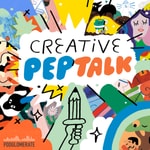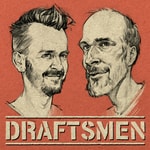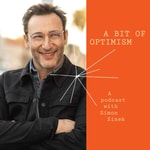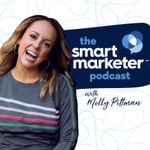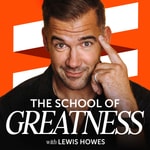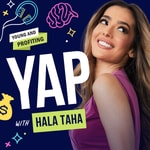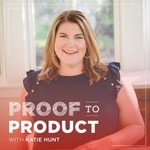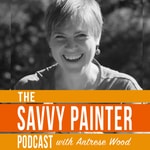The Ethical Rainmaker – Détails, épisodes et analyse
Détails du podcast
Informations techniques et générales issues du flux RSS du podcast.
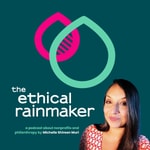
The Ethical Rainmaker
Michelle Shireen Muri
Fréquence : 1 épisode/22j. Total Éps: 41

Classements récents
Dernières positions dans les classements Apple Podcasts et Spotify.
Apple Podcasts
🇬🇧 Grande Bretagne - howTo
22/07/2025#98🇬🇧 Grande Bretagne - howTo
21/07/2025#72🇬🇧 Grande Bretagne - howTo
20/07/2025#44🇨🇦 Canada - howTo
14/07/2025#100🇨🇦 Canada - howTo
13/07/2025#72🇨🇦 Canada - howTo
12/07/2025#40🇨🇦 Canada - howTo
23/05/2025#100🇨🇦 Canada - howTo
22/05/2025#77🇨🇦 Canada - howTo
21/05/2025#47🇬🇧 Grande Bretagne - howTo
30/04/2025#80
Spotify
Aucun classement récent disponible
Liens partagés entre épisodes et podcasts
Liens présents dans les descriptions d'épisodes et autres podcasts les utilisant également.
See all- https://my-reflection-matters.mn.co/
553 partages
- https://www.sethgodin.com/
206 partages
- https://sdgs.un.org/goals
149 partages
Qualité et score du flux RSS
Évaluation technique de la qualité et de la structure du flux RSS.
See allScore global : 73%
Historique des publications
Répartition mensuelle des publications d'épisodes au fil des années.
The Hidden Danger of Purity Culture, ft. Lorraine Nibut
Saison 4 · Épisode 9
jeudi 29 décembre 2022 • Durée 48:42
Juicy episode alert! Michelle and Lorraine break down many aspects of purity culture and how this form of supremacy and oppression — controls and dictates how we express ourselves, causing anguish and keeping us from our best work. From large breasts, to Honey Boo Boo, the Atlanta spa shooting and fetishization, the Fyre Festival and consent violation ... Michelle and Lorraine explore the many ways purity culture holds us down — and what we can do to fight back against it!
Links:
Check out Michelle's workshop collabs here: https://www.freedom-conspiracy.com/workshops--trainings.html
Reach Lorraine Nibut here! https://www.linkedin.com/in/lorrainenibut/
The Game defends his 12yo, cite 1 and cite 2
Fyre Festival article and documentary
Purity culture as motive for Atlanta spa shootings
Lorraine's recommends:
+ Present how you are most comfortable, unapologetically
+ Embrace your identities - own it and rise above the shamers
+ Speak your needs choose courage over comfort as courage can bring comfort
+ Express when something is uncomfortable for you
+ Face when your own discomfort is preventing you from your own success
Why White People Have A Hard Time Being Real ft Fleur Larsen
Saison 4 · Épisode 8
vendredi 16 décembre 2022 • Durée 43:00
Fleur drops some knowledge especially for our white colleagues - for example "we can't move forward until we've tended to what's occurred - most orgs need to do repair...not pretend that we can just move forward like nothing happened, you gotta try and see what happens."
Check out our new workshops just for you!
Here are some of the resources she loves on this topic:
+ Generational Differences in Racial Equity Work by Dax-Devlon Ross
+ How to plan a White Caucus Agenda by Pippi Kessler
+ Racial Identity Caucusing: A Strategy for Building Anti-Racist Collectives by Crossroads
+ Why We're All Suffering from Racial Trauma (Even White People) -- and How to Handle It by Resmaa Menakem via Ten Percent Happier
+ A Call to White People: It's Time To Live In The Answer by Melia LaCour
Oh and Doctors Without Borders recently set this example of truth telling!
The Drizzle: Three Mistakes I've Made As A Fundraiser
Saison 4
mercredi 3 août 2022 • Durée 18:46
The Drizzle: How I Got Into Fundraising
Saison 4
mercredi 27 juillet 2022 • Durée 21:41
The Truth About Cancel Culture (and an alternative approach) ft Kevin Baker
Saison 3 · Épisode 10
mercredi 30 mars 2022 • Durée 37:41
Kevin Baker is bringing that rich voice and beautiful mindset to The Ethical Rainmaker! Kevin is a consultant whose mission focuses on making sure people can bring their authentic cultural selves to the workplace, creating healthier, more open workspaces that better serve employees and their clients. And he does this all through a diversity and inclusion lens.
You can find Kevin (and hire him) at The Kevin Baker Consulting
Thank you so much to Kevin for all the deep work you have done and for the work you do!!
The Ethical Rainmaker is a podcast, hosted by Michelle Shireen Muri, that explores the world of inequity in nonprofits and philanthropy, including where we should step into our power or step out of the way! It is my desire and effort to bring zero-cost information, case studies, and inspiration to everyone in the third sector — especially those who want to do better on this journey.
The truth about unhoused folx (and harm reduction!) ft. The Sidewalk Project
Saison 3 · Épisode 9
mercredi 16 mars 2022 • Durée 44:28
Soma Snakeoil and Stacey Dee are founders of The Sidewalk Project, bringing compassion instead of judgment to people living on the streets. “When systems fall down, people stand up!”
- The Sidewalk Project
- Soma Snakeoil, also called Goddess Soma, is an activist, a mediation facilitator, a visionary artist, a playright, a professional dominatrix…
- Stacee Dee’s band Bad Cop / Bad Cop (wiki, spotify)
Thank you so much to Stacy and Soma for sharing your deeply personal stories and for the work you do!!
The Ethical Rainmaker is a podcast, hosted by Michelle Shireen Muri, that explores the world of inequity in nonprofits and philanthropy, including where we should step into our power or step out of the way! It is my desire and effort to bring zero-cost information, case studies, and inspiration to everyone in the third sector — especially those who want to do better on this journey.
Follow the Ethical Rainmaker on Instagram, Twitter, listen wherever podcasts are found, and consider supporting the Ethical Rainmaker through Patreon!
How I Figured Out I Suffer From Toxic Productivity, ft. Marina Martinez-Bateman
Saison 3 · Épisode 8
mercredi 2 mars 2022 • Durée 44:18
Follow the Ethical Rainmaker on Instagram, Twitter, listen wherever podcasts are found, and consider supporting the Ethical Rainmaker through Patreon!
Marina Martinez-Batemanis a communications strategy consultant with over 20 years motivating people to take action. They are a serial entrepreneur, having started their work life and first business at the age of 13, and having created, consulted on, planned, and launched multiple business and projects
Marina’s businesses and hustle is about making money — without sacrificing their principles or values — which is really hard to do! They are a popular speaker, trainer, and peer mentor in the industry around topics like #abundance, #mentalhealth, #latinxleaders, #accountability, and #valuesbasedleadership.
Connect with Marina:
A lot of our content in this episode was story form — thank you so much to Marina for sharing their deeply personal stories!
The Ethical Rainmaker is a podcast, hosted by Michelle Shireen Muri, that explores the world of inequity in nonprofits and philanthropy, including where we should step into our power or step out of the way! It is my desire and effort to bring zero-cost information, case studies, and inspiration to everyone in the third sector — especially those who want to do better on this journey.
Why honesty is my favorite form of poetry w Matthew Cuban Hernandez
Saison 3 · Épisode 7
mercredi 16 février 2022 • Durée 34:36
Matthew Cuban Hernandez, is an award winning poet, emcee, performance artist and storyteller…. a rapper, actor and performance coach, as well as the author of:
- the book 3032, an anthology of poems
- …and two hip-hop albums - Ivanna and Ivanna 2.
You can purchase the book or albums here.
As a performer, Cuban has opened for artists like Wu-Tang, and he’s been featured on BuzzFeed, NPR and tv spots.
A teaching artist for nearly ten years, Matthew has spent the last six years working in youth detention centers across Los Angeles County, and is currently serving as:
- the Director of Camp Programming for Street Poets, Inc. In addition,
- he is a current Lead Teacher and Co-Founder of Spoken Literature Art Movement
Oh and he’s a fundraiser too - launching his book through a kickstarter campaign!
- You can find him on:
- Facebook: @MatthewCuban
- Insta: @matthewcubanofficial
- Twitter: @matthewcuban
A lot of our content in this episode was story form and on many different topics but here are notes on…
- Honesty
- “My favorite form of poetry is honesty” - Matthew Cuban Hernandez Matthew says that he believes honesty is a form of poetry in part because we so rarely hear it or experience it, even with ourselves” When you hear true honestly, it's like oh my god its beautiful.”
- “My favorite form of poetry is honesty” - Matthew Cuban Hernandez Matthew says that he believes honesty is a form of poetry in part because we so rarely hear it or experience it, even with ourselves” When you hear true honestly, it's like oh my god its beautiful.”
- At minute 8:08 Matthew talks about when it is an isn’t helpful to be honest, healthy dialogue…
- He also talks about how we are afraid to be openly wrong, that we [societally] don't allow room for that growth or building to happen b/c we want to be correct and we are scared of expressing an honest feeling and have others make us feel “less than.”
- He also talks about the honesty of correcting narratives ex: @ 11:19, when 90% of the people in youth detention are Black and brown kids, the kids might think “oh, well white kids must not do crime.” But Matthew points out the necessity of honesty here too “that’s not the actuality of what you are dealing with. There is a whole pipeline set up to have you right here right now…” “its not just you vs the judge/officers/another block/the GED system/trying to get a job/the college system. Understanding that these things are symbiotic is a big step in the right direction.
How I Became An Accidental Sweatshop Overlord w Kristina Wong
Saison 3 · Épisode 6
mercredi 2 février 2022 • Durée 30:22
Kristina Wong does some pretty incredible things with her life energy and creativity - damn!
- You can find Kristina Wong on:
- Facebook: @ilovekristinawong
- Insta: @mskristinawong
- Twitter: @mskristinawong
- Venmo: @givekristinawongmoney
In this episode we talked about several bodies of work she has created including:
- The Auntie Sewing Squad
- The massive mutual-aid network of volunteers across the United States, sewing homemade masks for vulnerable communities - like asylum seekers on the border, which Kristina started. In early 2022 they are still sewing and involve hundreds of Aunties, shipping thousands of masks to vulnerable communities across the US.
- The Book = Auntie Sewing Squad: Mask Making, Radical Care, Racial Justice (released 2021) talks about America’s pursuit of global empire at the cost of its citizens, the significance of women of color performing a historically gendered and racialized invisible labor…
- And was written with cool coauthor Rebecca Solnit
- Kristina Wong, Sweatshop Overlord
- Kristina Wong for Pubic Office
- She’s actually an elected official at her neighborhood council in LA’s Korea Town
- Legit check out her hand sewn props and if you have time, her interview on Sew and So is great! (and literally a sewing podcast.)
- Big Bad Chinese Mama.com a performance piece, her fake harem of brides - a “sophomoric” project that is still up!
- She’s been a guest on late night shows on NBC, Comedy Central, NFX…I watched ALL of these TV spots and you’ll enjoy them too!
Kristina references:
- Jose Luis Valenzuela and Teatro Campesino as well as Guillermo Gomez Pena as key artists of inspiration
- Art to Action, as the generous fiscal sponsor for The Auntie Sewing Squad
- Wild Harvest Food Bank is an LA food bank, operates as a grocery store for all, and their CEO Glen Corrado,
- $50 p/month food challenge, where she survives on that budget every month!
- Upcoming Project? Kristina plans a concept called Food Bank Influencer working on perhaps a food bank performance space to benefit the Navajo Nation - a nation which she reports, has only 13 grocery stores spread across three states serving 300,000 tribal citizens.
Courageous Fundraising Principles w Virginia Community Voice
Saison 3 · Épisode 5
mercredi 19 janvier 2022 • Durée 45:21
Lea Whitehurst Gibson and Bekah Kendrick talk to us about the processes they created and used to develop a community-centered organization with courageous fundraising principles…
- Virginia Community Voice “So our mission overall is to equip neighbors and historically marginalized communities to realize their vision for their communities. And then the second part of our vision, our mission is to prepare institutions to respond effectively.” Learn more and follow them on socials: Facebook, Insta, Twitter, LinkedIn and of course, you can donate here.
- Facebook: @virginiacommunityvoice
- Insta: @vacommunityvoice
- Website: https://vacommunityvoice.org/
- Lea Whitehurst Gibson is the Executive Director of VCV and is a seasoned community organizer. Priori to leading the VCV, Lea was the Director of Community Engagement at Thriving Cities Group. She also worked for Richmonders Involved to Strengthen our Communities (RISC) where she organized 1,000 people in 20 diverse congregations to stand together for just practices. Lea has a degree in theology from Elim Bible College.At VACV Lea oversees the organization’s operations, fundraising, staff and board development, and leads Community Voice Blueprint training and coaching. Lea and her husband are foster parents and live on Richmond’s Northside.Contact Lea at [email protected].
- Bekah Kendrick is an experienced nonprofit professional, grantmaker, and grant writer. Prior roles include: Technical & Grant Writer for Thriving Cities Group, Director of Community Impact: Education at United Way of Greater Richmond & Petersburg, and Director of Programs at MentorVirginia. Bekah has a Bachelors in American Studies from The College of William & Mary and Master’s in English from Virginia Commonwealth University. She manages fund development and communications for Virginia Community Voice. Bekah enjoys reading, hiking, and being near the water with her husband and son.Contact Bekah at [email protected].
- Find the Community Voice Blueprint here
- Virginia Community Voice was inspired by Community Centric Fundraising and its July 2020 launch!
- Here are the 10 principles of CCF, and here are the Courageous Fundraising Principles of Virginia Community Voice
Process:
Virginia Community Voice equips their neighbors to realize their vision for their own neighborhoods. Locally they work with marginalized communities that have not historically been listened to or heard and implementing the solutions they think best for their communities. And they work to prepare the official decision makers and traditional positional authority to listen and implement those solutions. All of this is towards a commitment for equity for the entire Commonwealth of Virginia - and specifically in Richmond, which is the former capital of the Confederacy.
It's important to know their programs:
1) RVA Thrives, has a goal and mission of equipping neighbors to realize their vision for their own community and to make sure they have resources and coaching to engage in what is happening in the neighborhood (food access, affordable housing, gentrification etc.)
2) Community Voice Blueprint (downloadable for free) is a four-step guide to community engagement around which they offer coaching and training.
As they are a Black and woman led organization, they wanted to make sure that their inception did not include the traditional racist and donor-centric practices that most npos use.
Here are a few notes about what Bekah and Lea describe as part of their process:
- They set the intention of dismantling old ways and centering racial equity, and “injecting equity into our entire process”
- They questioned whether they needed to start another nonprofit
- They looked for resources and saw no documented path towards equitable community engagement
- As they formed the organization (as a spin off of a white-led organization) they took the time to research fundraising norms and ways of working that they disliked and are rooted in white supremacy.
- In doing research in current norms and racism in philanthropy/fundraising specifically, they identified the most problematic:
- Donor centric fundraising only presents one model of who a donor can be. Said Bekah: “we knew we wanted to have a more democratic and accessible model in which all gifts are valued equally, no matter whether they're small or large, whether they're monetary or time. “
- Avoid communication that objectifies people, is myopic, acts as poverty porn or tourism, charity model or promotes white saviourism. Said Bekah: we wanted to move away from that toward communication storytelling that is affirming, that is telling a more complete and complex picture. Even if it's one that is uncomfortable.”
- Wanted to acknowledge and talk openly about how wealth is accumulated, the racist roots of nonprofits and philanthropy and how wealth is extracted through genocide, extraction of labor, and enslavement of people, and how foundations were founded.
- In summer 2020, they are inspired by the community centric fundraising principles and were already in the process of developing their own Courageous Fundraising Principles and their fundraising model.
- Once they had formulated their thoughts, they spent a lot of time working with all staff members, to make sure all felt invested and were engaged. Their staff include neighbors, considered community engagement specialists or community advocates (and they are at every staff meeting.)
- Then they went to their neighborhood steering committee
- Then they worked with their board as individuals, and then as a group
- They also took the time to talk to Spanish-speaking communities - translating the work and receiving feedback. And Black communities as well.
- They took their time!
- Once the Courageous Fundraising Principles were finalized, they threw a virtual party on Giving Tuesday to share with board, neighbors, investors and answered the following:
- What does it actually mean to invest in local community?
- How does VCV understand its relationship to money and to donors?
- What is a true investment?
- Why is this important? Why are old ways unethical?
- Where does VCV believe it should we be investing its time?
- They also asked folx to give feedback. (And they raised money)
- As part of tactics, they intentionally began using the term “investor” - investing time and money.
- They ask for folx to become “members” and membership includes a monthly recurring investment as well as three hours a month, amplifying the voices of people of color. They promise to honor these investments equally.
- They continually ask themselves “Is this the right way to do this? Is this causing harm whose voices are not at the table?”
- They respond to the community and are transparent with their budgeting process and budget
- In working with institutions, they envision that when they sign a grant agreement with grant guidelines, the funder will also agree to guidelines from VCV, affirming what they are doing.
- In creating their board of directors, the based their board on the community itself. With at least 75% people of color, who have lived experiences in marginalization. They deprioritized wealthy folx and report that they have not suffered from that choice. With a board that comes from the community, they have more equitable outcomes!
In giving advice, Lea says: “You will get pushback from people saying, like, I'm not sure!...Are you sure?” People of color were worried. Not because they didn't think it was the right thing or it was the right way to go, but they were worried for us as an organization because of potential retaliation that could come from something like this.
But here's the thing - we have not seen that, we have not seen retaliation. We have seen our capacity grow. We have seen, investment stay and in some places grow because we've chosen to do the bold thing. Again, when you hit a point of tension on the other side, there's beauty. It is also still scary. But we're going to push forward because we know that there is something more beautiful on the other side. And that has been true of my life in general. But specifically in this space, it was scary, but also right.”
So much wisdom in this episode but I love this quote:
“For us, this is not about just doing this work, doing you know, our courageous fundraising principles, , focusing our work around equity, focusing our work around the community, rooted solutions to the problems that we face every day for the sake of doing that. We are doing it because our lives are at stake, our communities are at stake, our families are at stake. And that is the reason for this. It is not about what we think the next big thing is or how we want to move, you know, in the world differently. It is about, the very soul of our spaces, of our communities, of our lives, of our children's lives. What I want to say is this, this is real life. It affects real people. And if we don't start to change things, our children are going to keep dying in the street. That's, what's going to keep happening. If we allow our culture to support in equitable outcomes and equitable processes and equitable policies that is what's going to keep happening.”
Okay also this one:
“...you have the opportunity to pivot and to say, we need to do something differently or to kind of stay the course along the norms that are continually hurting our communities. And so we made the choice to pivot and that's, and that's actually where the beauty came from. Cause you know, it's, it's a point of tension, right? Like you get to a point where you're like, oh, we're doing something that's not fully equitable. Do we cover it up? Do we like, you know, wash it over or do we, or do we lean into the tension and say we didn't do something right. We admit to it and we want to change it. And what I find every single time is that there's beauty on the other side of leaning into that tension.”
